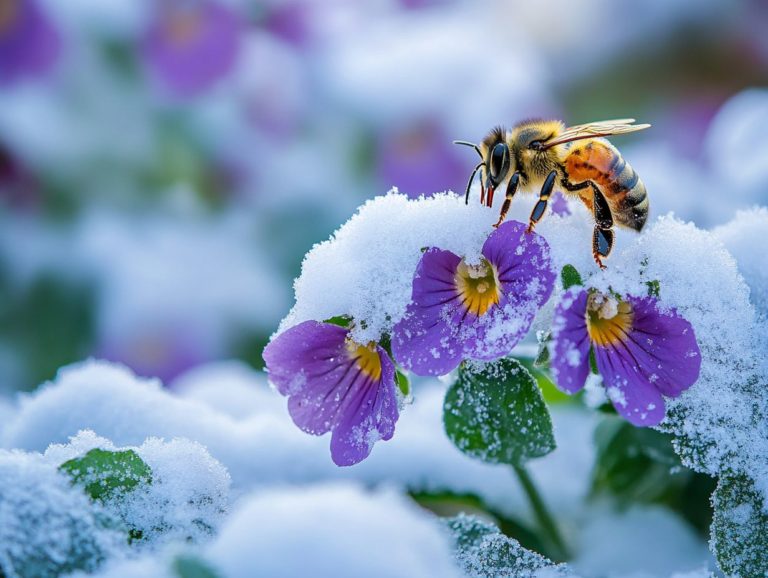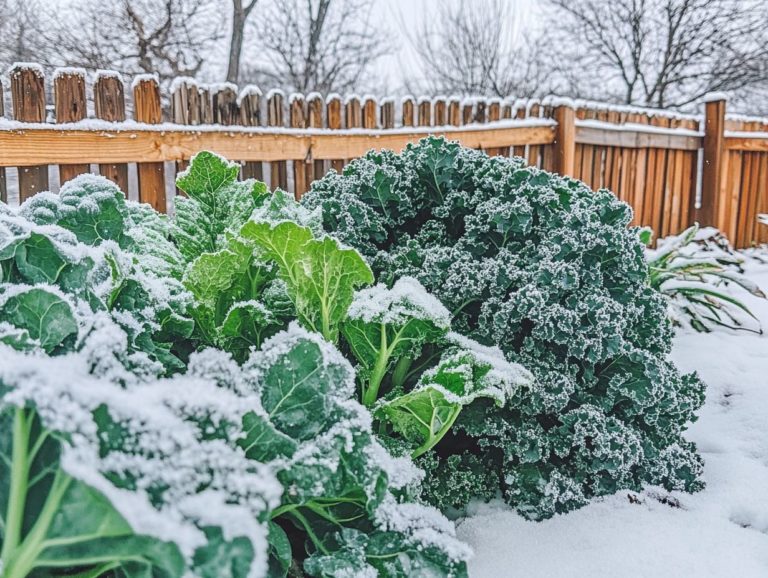5 Techniques for Winter Pest Management
As winter draws near, the comfort of your indoors can be interrupted by unwelcome pests seeking warmth. You must adopt effective pest management strategies to maintain your home as a true sanctuary.
This article covers five practical techniques, from sealing potential entry points to using natural repellents.
It also discusses common winter pests you might encounter, the risks associated with infestations, and guidance on when to get professional help.
Discover how to protect your home from pest problems and enjoy a pest-free winter season!
Contents
- Key Takeaways:
- 1. Seal Entry Points
- 2. Keep Your Home Clean and Clutter-Free
- 3. Use Natural Pest Repellents
- 4. Hire a Professional Pest Control Service
- 5. Regularly Inspect and Maintain Your Home
- What Pests Are Common During Winter?
- How Can Pests Enter Your Home During Winter?
- What Are the Risks of Ignoring Pest Infestations?
- How Can You Prevent Pests from Entering Your Home?
- What Are the Benefits of Using Natural Pest Repellents?
- When Should You Hire a Professional Pest Control Service?
- What Steps Should You Take to Maintain a Pest-Free Home?
- How Often Should You Inspect Your Home for Pests?
- What Should You Do If You Find a Pest Infestation?
- How Can You Prepare Your Home for Winter Pest Management?
- What Are the Long-Term Effects of Neglecting Pest Management?
- Frequently Asked Questions
- What are the benefits of using 5 techniques for winter pest management?
- What are the 5 techniques for winter pest management?
- How does sealing cracks and crevices help in winter pest management?
- Why is proper food storage and disposal important for winter pest management?
- What natural deterrents can be used for winter pest management and prevent pests?
- Is it necessary to seek professional pest control services for managing winter pests?
Key Takeaways:

- Seal entry points to prevent winter pests from entering your home.
- Maintain a clean and clutter-free home to discourage pests from nesting.
- Use natural pest repellents to avoid harmful chemical pesticides.
1. Seal Entry Points
To effectively prevent pests, you must seal any entry points in your home. Small gaps and openings can act like welcome mats for various winter pests, including rodents, squirrels, and cockroaches. These pests pose serious threats to your home s integrity and your health during the colder months.
Pay attention to areas like windows, doors, plumbing, and chimneys. These are prime access points for unwanted invaders. Gaps around window frames and ill-fitting doors allow pests to slip inside, while worn-out weather stripping creates larger vulnerabilities. Don t overlook plumbing entrances, as they often go unnoticed and can serve as hidden pathways for smaller critters, contributing to potential rodent infestations. Additionally, chimneys without proper caps can become inviting shelters for wildlife seeking warmth.
Engaging professional pest control services is a wise choice. They ensure a thorough inspection and effective sealing of these vulnerabilities. By taking these steps, you ll be safeguarding your home against infestations and potential damage. Start sealing those gaps now!
2. Keep Your Home Clean and Clutter-Free
Maintaining a clean and clutter-free home is vital for effective pest management. It removes food and water that attract pests like mice, cockroaches, and spiders, especially during winter when indoor pest activity tends to spike. Knowing how to identify cold-weather pest problems can further help in addressing these issues promptly.
Focus on high-risk areas like the kitchen, where crumbs and spills can quickly become a feast for these pests. Regularly wipe down surfaces and promptly address any food spills to significantly reduce attractants.
Organize spaces like basements by storing items in sealed containers instead of cardboard boxes, limiting potential hiding spots for pests. Managing moisture is also essential fix leaks and use dehumidifiers to create an unwelcoming environment, as many pests thrive in damp conditions.
By incorporating these proactive measures into your daily routines, you can greatly bolster your defenses against infestations. Keep your spaces tidy to help deter pests!
3. Use Natural Pest Repellents
Using natural pest repellents is a smart, sustainable pest control strategy. It helps prevent pests while ensuring the safety of your family and pets by minimizing exposure to harmful chemicals found in traditional pest control products.
Incorporate eco-friendly methods like essential oils, vinegar solutions, and diatomaceous earth into your pest management routine. These methods can effectively deter common winter nuisances such as spiders, ants, and roaches. Essential oils, particularly peppermint and tea tree, emit strong scents that pests can’t tolerate. Vinegar concoctions repel insects and cleanse areas affected by infestations. Meanwhile, diatomaceous earth serves as an abrasive barrier, safely eliminating various crawling pests. For more detailed strategies, check out our guide on preventing indoor pests during winter.
Embracing these natural approaches not only promotes a healthier living environment but also contributes to a more sustainable ecosystem. Start using natural solutions today!
4. Hire a Professional Pest Control Service
Hiring a professional pest control service like Kness Pest Defense can change how you manage pest issues. This is especially important during the winter months when rodents and other pests invade homes for warmth and food.
Using these services ensures effective pest removal. You’ll also benefit from thorough inspections that find places where pests can get in, allowing you to act proactively.
Experts design targeted pest control strategies for your situation. This approach minimizes chemical use and is considerate of our environmental impact.
Implementing ongoing maintenance plans provides regular check-ups to prevent future infestations. Seek help as soon as you notice signs of pest activity or health risks. A pest-free environment is essential for your well-being.
5. Regularly Inspect and Maintain Your Home
Regular home inspections are crucial for spotting potential pest activity early. Implementing essential traps for cold-weather pests and fixing issues like plumbing leaks and improper firewood storage helps keep pests away during winter.
Create a seasonal maintenance checklist to evaluate often-overlooked areas. This proactive approach seals entry points and reduces moisture that attracts pests.
Simple tasks like sealing windows and doors and keeping your gutters clean deter common pests. Sweeping your chimney not only promotes safe heating but also minimizes rodent infestations.
Proactive home maintenance safeguards your space and creates a healthier, more comfortable environment.
What Pests Are Common During Winter?

During winter, pests can become a major headache as they seek warmth and food. You might see common intruders like rodents, including mice and squirrels, and unwelcome guests like cockroaches and termites.
These pests invade your home and pose health risks by spreading diseases. Mice can reproduce quickly, turning a small issue into a full-blown infestation in weeks. Squirrels can chew through wires, risking electrical fires.
Recognizing early signs like droppings or gnaw marks is key. This knowledge helps you act quickly to minimize property damage and protect your family s health.
How Can Pests Enter Your Home During Winter?
Pests can enter your home through cracks in the foundation, gaps around windows and doors, and plumbing systems. They search for warmth and food, making your home appealing.
Rodents and insects exploit these vulnerabilities. Mice can fit through openings as small as a quarter, and even tiny ants can squeeze through minuscule gaps. Pests also use trees and shrubs as bridges to access your home.
Sealing these entry points minimizes infestations and protects your home from structural damage. Regular inspections and materials like caulk, weather stripping, and mesh screens strengthen your defenses.
What Are the Risks of Ignoring Pest Infestations?
Ignoring pest infestations can expose you to a range of health risks and safety concerns. This includes property damage, contamination of food sources, and encounters with disease-carrying pests like rodents and cockroaches. This makes it clear: we need solid pest control methods.
The repercussions of neglecting these issues can be severe. They can lead to costly repairs and significant disruptions in your daily life. For instance, structural damage from termites can threaten the integrity of your home. Hidden mold from damp conditions associated with pest activity can worsen respiratory illnesses. The spread of allergens from pests can also seriously threaten health, especially for vulnerable individuals such as children and the elderly.
By adopting a proactive approach to pest control, you can mitigate these risks, ensuring your home remains safe and sustainable while protecting your family’s health.
How Can You Prevent Pests from Entering Your Home?
To effectively prevent pests from infiltrating your home, focus on sealing entry points, maintaining cleanliness, and managing food and moisture sources that attract winter nuisances. Implementing effective pest control in cold climates creates a less inviting environment for unwanted guests.
Begin by inspecting your home for cracks or gaps in walls, windows, and doors these are common access points for insects and rodents. Use high-quality caulk to seal these spaces, ensuring even the tiniest openings are secured. Installing weather stripping can significantly reduce gaps around doors, adding another layer of protection.
Proper food storage is crucial. Keep all food items in airtight containers and promptly clean up any spills and crumbs. Establishing regular cleaning routines, including vacuuming and dusting, will help eliminate hiding spots and deter potential infestations. This will make it easier for you to maintain a pest-free sanctuary throughout the colder months.
What Are the Benefits of Using Natural Pest Repellents?
Natural pest repellents offer a wealth of advantages for you, including reduced chemical exposure, eco-friendliness, and effective deterrence against common pests. This makes them a favored choice for homeowners aiming to maintain a pest-free environment during winter.
Ingredients like essential oils, diatomaceous earth, and garlic specifically target pests such as ants, spiders, and rodents. They pose minimal risk to your pets and children. Unlike synthetic chemicals that can leave harmful residues and contribute to environmental pollution, natural alternatives work by disrupting pests’ sensory systems or creating inhospitable environments.
By choosing these eco-friendly solutions, you support a holistic approach to home care. This promotes biodiversity and encourages beneficial insects. By opting for natural repellents, you’re not just addressing infestations; you’re taking a significant step towards creating healthier living spaces.
When Should You Hire a Professional Pest Control Service?
Knowing when to bring in a professional pest control service like Kness Pest Defense is vital for effective pest management. This is especially true when you’re facing stubborn infestations or when your preventive measures aren’t cutting it.
If pests have turned your home into their playground, or when their presence threatens your health, don’t wait! Call in the experts. Take, for example, infestations of rodents or termites; these nuisances can wreak havoc on your property while posing serious health risks through disease transmission. Experts have the skills and tools you need to accurately assess the situation, implementing targeted treatments that yield far better results than any DIY approach could achieve.
Furthermore, their ongoing prevention strategies are crucial for reducing future risks, ensuring your space remains safe and pest-free.
What Steps Should You Take to Maintain a Pest-Free Home?

To maintain a pest-free home, you need to use comprehensive pest control strategies. These strategies should include regular inspections, proper sanitation, and proactive measures to seal entry points. Additionally, following the best practices for pest monitoring in winter and reducing food and moisture sources that attract winter pests is essential.
Schedule routine inspections at least each season. Look for signs of infestations and any vulnerabilities in your home. Developing a careful cleaning routine is vital. This means vacuuming regularly and keeping kitchen surfaces spotless and free of food residues.
Don t overlook potential entry points. Sealing gaps in windows and doors can dramatically reduce the chances of pests getting inside. Implementing effective waste disposal methods and keeping your outdoor areas tidy by removing debris and maintaining landscaping will further deter unwanted visitors. This is a crucial part of your overall pest prevention strategy.
How Often Should You Inspect Your Home for Pests?
Regular inspections are crucial for catching pest activity before it spirals out of control. Homeowners should conduct these checks at least quarterly or more frequently during peak pest seasons to effectively manage and mitigate potential infestations.
These routine inspections help you identify trouble spots early and promote a proactive mindset toward pest management. Pay attention to entry points like windows and doors, as well as damp areas such as basements and kitchens, where pests often flourish.
Look for signs like droppings, gnawed materials, or unusual nests these can indicate an underlying issue. By consistently monitoring these areas, you can intervene promptly, preventing a minor annoyance from turning into a full-blown infestation. This ensures a healthier living environment while minimizing the need for harsh chemical treatments.
What Should You Do If You Find a Pest Infestation?
If you face a pest infestation, act immediately! Start by assessing the situation, eliminating sources of food and moisture, and contacting a professional pest control service like Kness Pest Defense to tackle the issue effectively.
Taking these immediate steps is crucial to prevent further damage to your home or business. Pests multiply quickly; procrastination may lead to a more significant infestation that’s harder to manage.
It’s wise to document affected areas and visible pests. This information can assist professionals in creating a thorough treatment plan tailored to your situation. By relying on expert services, you ensure a meticulous extermination process and gain access to long-term prevention strategies to protect against future invasions.
With proper management and ongoing monitoring, you’ll maintain a pest-free environment that remains comfortable for everyone.
How Can You Prepare Your Home for Winter Pest Management?
Preparing your home for winter pest management involves a thorough winterization process. Start by sealing any entry points, fixing plumbing leaks, and ensuring your firewood is stored properly. Additionally, utilizing essential cold-weather pest management tools can significantly reduce the risk of pest infestations during colder months.
Conduct an energy audit to identify areas where heat escapes. An energy audit helps pinpoint where heat may be lost, which can attract pests looking for warmth. Check windows, doors, and attics for gaps that could serve as access points for unwanted guests.
Maintaining a clean environment is also crucial. Store food securely and clean up spills routinely to deter pests from seeking refuge in your home this winter.
Consider trimming back any vegetation near your foundation. This can act as a bridge for pests eager to invade your cozy space.
What Are the Long-Term Effects of Neglecting Pest Management?
Neglecting pest management can lead to serious long-term problems you can’t afford to ignore! Structural damage to your home, increased health risks from pest-related diseases, and a pest control scenario that becomes increasingly challenging and costly down the line are just a few consequences.
Beyond these pressing issues, such oversight can also jeopardize your property value. This creates additional financial burdens you d rather not face. Unchecked pest problems not only compromise the safety of your living spaces but may also deter potential buyers, resulting in significant market depreciation.
Pests like rodents and insects can transmit serious illnesses, putting your family at risk for conditions such as allergies, asthma, or even severe viral infections. This shows why it’s so important to manage pests proactively!
By addressing issues early on, you can greatly reduce the likelihood of severe outcomes. This fosters a healthier environment and protects your investments for the future.
Frequently Asked Questions
What are the benefits of using 5 techniques for winter pest management?

Using multiple techniques for managing pests in the winter season can greatly reduce the pest population. Implementing best practices for winter pest control prevents infestations, leading to a healthier and more comfortable living environment.
What are the 5 techniques for winter pest management?
The 5 tricks to keep pests away in winter include sealing cracks and crevices, proper storage and disposal of food, regular cleaning and decluttering, using natural deterrents, and seeking professional pest control services.
How does sealing cracks and crevices help in winter pest management?
Sealing cracks and crevices in your home prevents pests from entering and finding shelter in your warm and cozy living space. This technique is especially effective for small pests like rodents and insects.
Why is proper food storage and disposal important for winter pest management?
Pests are attracted to food sources, and winter is a time when they seek shelter and food indoors. Properly storing food and disposing of food waste minimizes the chances of attracting pests into your home.
Maintaining safety and health standards in residential buildings can reduce the likelihood of rodent infestations and pest control challenges.
It is also important to ensure firewood storage is away from the home to prevent attracting outdoor pests.
Implementing cleaning routines can help winterize homes against pest activity.
What natural deterrents can be used for winter pest management and prevent pests?
Natural deterrents, which are safe substances like peppermint oil, cayenne pepper, and vinegar, can effectively repel winter pests and other common pest problems. These substances are non-toxic and safe for use around pets and children.
Is it necessary to seek professional pest control services for managing winter pests?
While DIY techniques can be effective in managing pests, such as rodents and spiders, seeking professional pest control services can ensure proper and thorough treatment of the infestation. Professionals have the knowledge and tools to effectively eliminate pests and identify moisture sources.
Start your proactive pest management today to protect your home!






